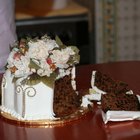
Cream cheese isn't just for making icing -- you can also use it to create a tasty filling you can inject into the middle of your freshly baked cupcakes. Because cream cheese is a dairy product, though, you'll need to refrigerate your cupcakes after filling them with it to keep them from spoiling. If you don't want to refrigerate the cupcakes themselves, stuff them with filling just before serving.
Never Leave Cupcakes Hanging Around
Cupcakes filled with cream cheese, whipped cream or custard all require refrigeration to prevent these ingredients from spoiling. Although the sugar contained in a sweet cream-cheese filling helps to discourage the growth of bacteria, it's best to follow the U.S. Food and Drug Administration's "two-hour" rule when it comes to anything containing cream cheese. Never leave your cream cheese-filled cupcakes out of the refrigerator, set to 40 degrees Fahrenheit or below, for more than two hours. Discard any cupcakes that have been sitting out for longer than this time or for more than one hour in temperatures above 90 F to prevent foodborne illness.
Nobody Wants Dry Cupcakes
When storing your filled cupcakes in the refrigerator, you'll need to wrap them first to keep them moist. Wrap frosted or unfrosted cupcakes in plastic wrap or aluminum foil. The cupcakes will keep for about one week, based on the shelf lives of both cake and cream cheese. Although you can wrap and freeze the cupcakes for around two months at 0 F, freezing will cause the cream cheese filling to become crumbly in texture and possibly affect its flavor. Instead, freeze unfilled cupcakes, wrapped in plastic or placed in freezer bags, then fill them after thawing them.
Keep 'Em Separated
While refrigeration is necessary to prevent the growth of bacteria or other spoilage microorganisms in the cream cheese filling of your cupcakes, it can dry out the cake. To prevent this from happening, you can bake your cupcakes and store them in a cool, dark pantry for up to two days before filling, frosting and serving them. Cream cheese has a shelf life of up to two weeks, so you can make the filling well ahead of time and store it in a sealed container in your refrigerator to have on hand. When it's time to fill and frost the cupcakes, do so the day you plan to serve them to keep the refrigeration time to a minimum.
Something Smells (or Tastes) Fishy
Use your senses to help determine whether or not your filled cupcakes are still edible. Cupcakes that smell strange or appear to have visible mold are definitely spoiled and should be discarded. Cut them open to check on the filling before eating them. If the filling smells sour, has an unusually grainy texture or appears discolored or watery, it's spoiled and you need to throw it away. Eating cupcakes with cream cheese filling that has spoiled can make you very sick. Note that cupcakes left out at temperatures between 41 and 135 F for longer than two hours may not smell or taste bad, but could contain bacteria and need to be thrown away.
Related Articles

How Early Can You Make a Wedding Cake?

How Long Can Cupcakes Be Stored After ...

Does Cream-Based Frosting Have to Be ...
How to Freeze a Fruitcake
How Long Can Cupcakes Be Stored After ...

Do Boston Cream Pie Cupcakes Need ...

How to Keep Cake Moist Overnight ...

Do You Have to Refrigerate Your Wedding ...

Proper Storage of a Carrot Cake

Can a Cream Cheese-Decorated Cake Be ...

Baking Cupcakes Two Days Ahead

Can You Eat Sour Cream If It's Been ...

How to Defrost a Frozen Cake With ...

Can I Refreeze Cheesecake?

What Will Happen if You Refrigerate ...

How Long Is Cake Safe to Eat?

Do You Need to Refrigerate Whipped ...

How to Serve Cannoli

Proper Ways to Thaw a Wedding Cake

How to Use Expired Cake Mix
References
- U.S. Food and Drug Administration: Are You Storing Food Safely?
- Wilton: Cream Cheese Filling
- Still Tasty: Dairy & Eggs
- EatByDate: How Long Does Cream Cheese Last?
- EatByDate: How Long Does Cake Last?
- Still Tasty: Baked Goods
- The Kitchn: Expert Advice: How to Wrap, Store, and Keep Cake Fresh
- Shelf Life Advice: Is There a Way to Tell, via Smell, Taste, Appearance or Texture, if Cream Cheese is Spoiled?
Resources
Writer Bio
Based in Las Vegas, Susan Paretts has been writing since 1998. She writes about many subjects including pets, finances, crafts, food, home improvement, shopping and going green. Her articles, short stories and reviews have appeared on City National Bank's website and on The Noseprint. Paretts holds a Master of Professional Writing from the University of Southern California.
Photo Credits
Todd Warnock/Photodisc/Getty Images